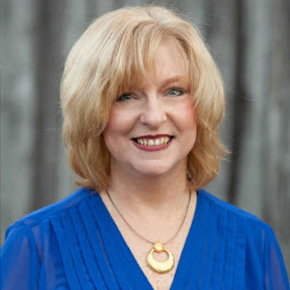Julie Masterson: At the Center of Large-Scale Publicity Campaigns

“Here you have this awesome platform [the media] that will allow people to learn about our profession. People inevitably say, ‘I’m so surprised, I didn’t realize speech-language pathologists did this.’ Here is an opportunity to change that.”
When the first edition of Beyond Baby Talk came out in 2001, it was a dream realized for people besides co-author Julie Masterson, PhD, CCC-SLP. ASHA’s then-longtime executive director, Fred Spahr, had always wanted ASHA to release a book on language development that would serve as a resource for parents and caregivers. When he tapped Masterson, an active ASHA volunteer and Board member at the time, to lead the charge, she agreed on one condition: her close collaborator since graduate school, Kenn Apel, would serve as co-author.
Fast forward a decade to October 2012. Masterson and Apel were preparing for another media blitz around the publication of the second edition of the language and literacy guide. For Masterson, this was not unfamiliar territory. She had been at the center of the large-scale publicity campaign organized by ASHA more than a decade earlier to support the first edition. The predominant medium then was radio, and Masterson participated in many live interviews. It was a role she became comfortable with.
The media landscape in 2012 was drastically different, however. So-called mommy (and daddy) bloggers, Facebook, and other social media became just as important as the “traditional” media Masterson was accustomed with. There was a lot more to navigate than in the past.
Nonetheless, Masterson thoroughly enjoyed speaking to this new crop of media. One of the primary reasons dovetails with the intent of Beyond Baby Talk—the chance to help educate parents, some who may be needlessly worried and others who should be seeking an assessment because they have a child who may have a speech or language disorder. Many of the bloggers Masterson spoke with were parents themselves, and were writing from that perspective.
Masterson recalls an interview with Today Moms, an online offshoot of NBC’s The Today Show that features parenting articles and resources. The conversation was indicative of what Masterson often hears.
“I think there is a lot of pressure on parents,” Masterson says. “They want to make sure their children are at the same point as their peers developmentally.” She relishes the opportunity to reach parents on a bigger stage through media, advising them to seek expert sources instead of comparing the children in their playgroups.
Beyond educating parents about speech and language, Masterson points to other benefits of participating in media interviews. One is the opportunity to set the record straight on common misconceptions. A particular pet peeve of hers: the lack of connection that people make between speech and language and literacy. One other reason that is especially close to her heart is informing the public about the role of speech-language pathologists. For that reason, she’d encourage other members to get involved in media efforts.
“Think about it,” she says. “Here you have this awesome platform [the media] that will allow people to learn about our profession. People inevitably say, ‘I’m so surprised, I didn’t realize speech-language pathologists did this.’ Here is an opportunity to change that.”











